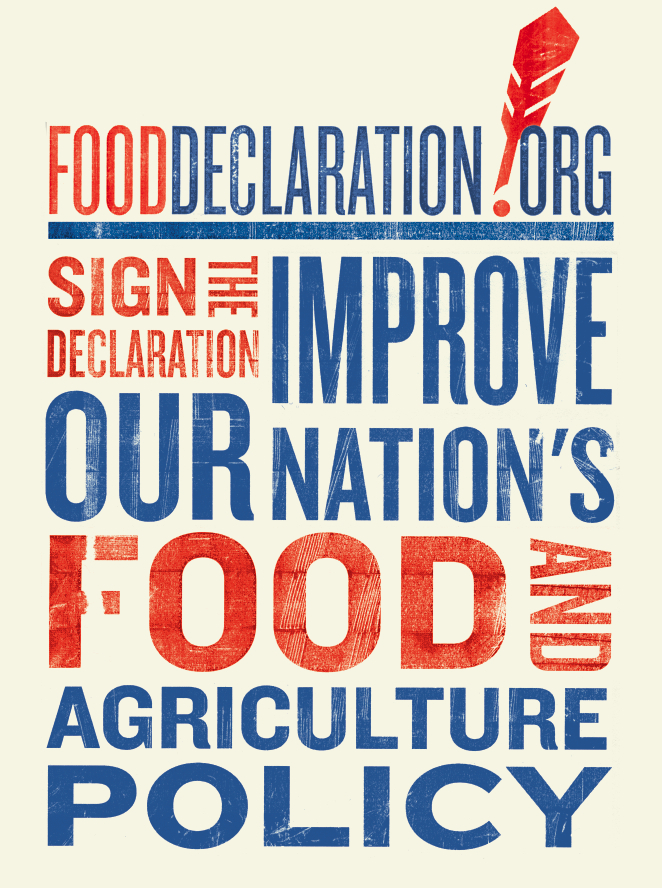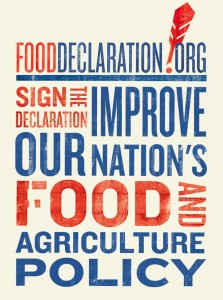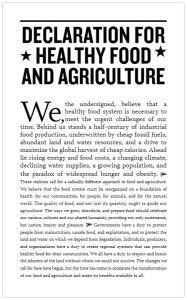
 The movement to create a healthier food and agriculture policy in the US has been slowly and steadily gaining ground for well over a decade. Those all around the nation who began the work are encouraged by the progress and simultaneously concerned by the pace of change given the disproportionate impact of food and agriculture on personal and planetary health.
The movement to create a healthier food and agriculture policy in the US has been slowly and steadily gaining ground for well over a decade. Those all around the nation who began the work are encouraged by the progress and simultaneously concerned by the pace of change given the disproportionate impact of food and agriculture on personal and planetary health.
The public’s increasing interest and the media’s deepening coverage of climate change, energy, agriculture, rural poverty, labor issues, food costs, food quality and obesity may finally illuminate the interrelationship of these crises and provide a context for urgently needed changes, which are clearly possible. The Declaration is meant to provide:
- A clear statement of what kind of policy is needed now, endorsed by a broad base of organizations and individuals with a long-established commitment to a healthier food and agriculture.
- An invitation to all Americans to join in the improvement effort by taking action in their own lives and communities and by offering them a way to call on policy makers to support comprehensive change.
- A set of principles from which policy makers can craft policy that will lead to a healthier food system.
After the first draft was completed, significant contributions were made by Wendell Berry, poet and author; Judith Bell and Sarah Treuhaft, of Policy Link; Stephen Gliessman, UC Santa Cruz; Alan Hunt, Northeast-Midwest Institute; Vance Russell, formerly with Audubon CA; and Winona LaDuke, Native American Leader. An original framer, Michael Pollan, edited the third draft. Over 200 national food and agriculture leaders immediately endorsed the Declaration.
The Declaration for Healthy Food and Agriculture
“We, the undersigned, believe that a healthy food system is necessary to meet the urgent challenges of our time. Behind us stands a half-century of industrial food production, underwritten by cheap fossil fuels, abundant land and water resources, and a drive to maximize the global harvest of cheap calories. Ahead lie rising energy and food costs, a changing climate, declining water supplies, a growing population, and the paradox of widespread hunger and obesity.
These realities call for a radically different approach to food and agriculture. We believe that the food system must be reorganized on a foundation of health: for our communities, for people, for animals, and for the natural world. The quality of food, and not just its quantity, ought to guide our agriculture. The ways we grow, distribute, and prepare food should celebrate our various cultures and our shared humanity, providing not only sustenance, but justice, beauty and pleasure.
Governments have a duty to protect people from malnutrition, unsafe food, and exploitation, and to protect the land and water on which we depend from degradation. Individuals, producers, and organizations have a duty to create regional systems that can provide healthy food for their communities. We all have a duty to respect and honor the laborers of the land without whom we could not survive. The changes we call for here have begun, but the time has come to accelerate the transformation of our food and agriculture and make its benefits available to all.
We believe that the following twelve principles should frame food and agriculture policy, to ensure that it will contribute to the health and wealth of the nation and the world. A healthy food and agriculture policy:
- Forms the foundation of secure and prosperous societies, healthy communities, and healthy people.
- Provides access to affordable, nutritious food to everyone.
- Prevents the exploitation of farmers, workers, and natural resources; the domination of genomes and markets; and the cruel treatment of animals, by any nation, corporation or individual.
- Upholds the dignity, safety, and quality of life for all who work to feed us.
- Commits resources to teach children the skills and knowledge essential to food production, preparation, nutrition, and enjoyment.
- Protects the finite resources of productive soils, fresh water, and biological diversity.
- Strives to remove fossil fuel from every link in the food chain and replace it with renewable resources and energy.
- Originates from a biological rather than an industrial framework.
- Fosters diversity in all its relevant forms: diversity of domestic and wild species; diversity of foods, flavors and traditions; diversity of ownership.
- Requires a national dialog concerning technologies used in production, and allows regions to adopt their own respective guidelines on such matters.
- Enforces transparency so that citizens know how their food is produced, where it comes from, and what it contains.
- Promotes economic structures and supports programs to nurture the development of just and sustainable regional farm and food networks.
Our pursuit of healthy food and agriculture unites us as people and as communities, across geographic boundaries, and social and economic lines. We pledge our votes, our purchases, our creativity, and our energies to this urgent cause.”
Roots of Change grounds its California and federal policy agendas in the Food Declaration because we believe that sound public policy for the good food movement should come directly from the voices of the people, and not corporate industrial interests. We invite you to learn more about our current and past food systems advocacy.
